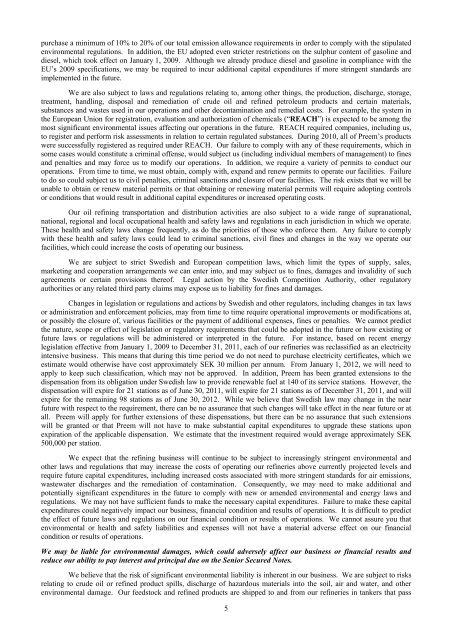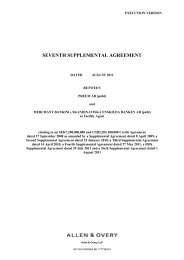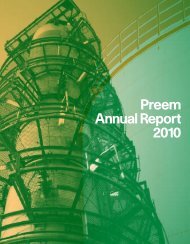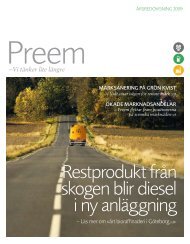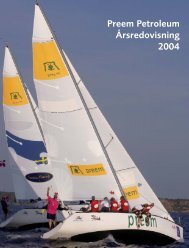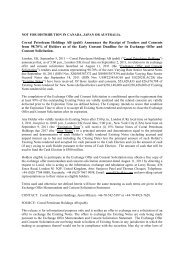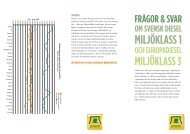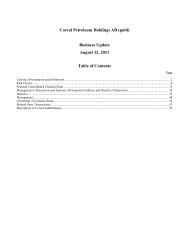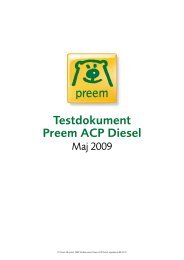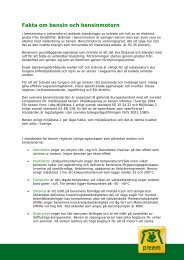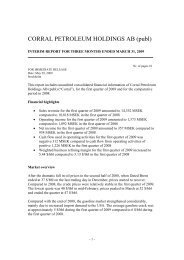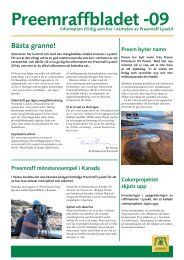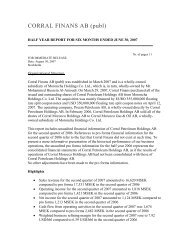purchase a minimum of 10% to 20% of our total emission allowance requirements in order to comply with the stipulatedenvironmental regulations. In addition, the EU adopted even stricter restrictions on the sulphur content of gasoline anddiesel, which took effect on January 1, 2009. Although we already produce diesel and gasoline in compliance with theEU’s 2009 specifications, we may be required to incur additional capital expenditures if more stringent standards areimplemented in the future.We are also subject to laws and regulations relating to, among other things, the production, discharge, storage,treatment, handling, disposal and remediation of crude oil and refined petroleum products and certain materials,substances and wastes used in our operations and other decontamination and remedial costs. For example, the system inthe European Union for registration, evaluation and authorization of chemicals (“REACH”) is expected to be among themost significant environmental issues affecting our operations in the future. REACH required companies, including us,to register and perform risk assessments in relation to certain regulated substances. During 2010, all of <strong>Preem</strong>’s productswere successfully registered as required under REACH. Our failure to comply with any of these requirements, which insome cases would constitute a criminal offense, would subject us (including individual members of management) to finesand penalties and may force us to modify our operations. In addition, we require a variety of permits to conduct ouroperations. From time to time, we must obtain, comply with, expand and renew permits to operate our facilities. Failureto do so could subject us to civil penalties, criminal sanctions and closure of our facilities. The risk exists that we will beunable to obtain or renew material permits or that obtaining or renewing material permits will require adopting controlsor conditions that would result in additional capital expenditures or increased operating costs.Our oil refining transportation and distribution activities are also subject to a wide range of supranational,national, regional and local occupational health and safety laws and regulations in each jurisdiction in which we operate.These health and safety laws change frequently, as do the priorities of those who enforce them. Any failure to complywith these health and safety laws could lead to criminal sanctions, civil fines and changes in the way we operate ourfacilities, which could increase the costs of operating our business.We are subject to strict Swedish and European competition laws, which limit the types of supply, sales,marketing and cooperation arrangements we can enter into, and may subject us to fines, damages and invalidity of suchagreements or certain provisions thereof. Legal action by the Swedish Competition Authority, other regulatoryauthorities or any related third party claims may expose us to liability for fines and damages.Changes in legislation or regulations and actions by Swedish and other regulators, including changes in tax lawsor administration and enforcement policies, may from time to time require operational improvements or modifications at,or possibly the closure of, various facilities or the payment of additional expenses, fines or penalties. We cannot predictthe nature, scope or effect of legislation or regulatory requirements that could be adopted in the future or how existing orfuture laws or regulations will be administered or interpreted in the future. For instance, based on recent energylegislation effective from January 1, 2009 to December 31, 2011, each of our refineries was reclassified as an electricityintensive business. This means that during this time period we do not need to purchase electricity certificates, which weestimate would otherwise have cost approximately SEK 30 million per annum. From January 1, 2012, we will need toapply to keep such classification, which may not be approved. In addition, <strong>Preem</strong> has been granted extensions to thedispensation from its obligation under Swedish law to provide renewable fuel at 140 of its service stations. However, thedispensation will expire for 21 stations as of June 30, 2011, will expire for 21 stations as of December 31, 2011, and willexpire for the remaining 98 stations as of June 30, 2012. While we believe that Swedish law may change in the nearfuture with respect to the requirement, there can be no assurance that such changes will take effect in the near future or atall. <strong>Preem</strong> will apply for further extensions of these dispensations, but there can be no assurance that such extensionswill be granted or that <strong>Preem</strong> will not have to make substantial capital expenditures to upgrade these stations uponexpiration of the applicable dispensation. We estimate that the investment required would average approximately SEK500,000 per station.We expect that the refining business will continue to be subject to increasingly stringent environmental andother laws and regulations that may increase the costs of operating our refineries above currently projected levels andrequire future capital expenditures, including increased costs associated with more stringent standards for air emissions,wastewater discharges and the remediation of contamination. Consequently, we may need to make additional andpotentially significant expenditures in the future to comply with new or amended environmental and energy laws andregulations. We may not have sufficient funds to make the necessary capital expenditures. Failure to make these capitalexpenditures could negatively impact our business, financial condition and results of operations. It is difficult to predictthe effect of future laws and regulations on our financial condition or results of operations. We cannot assure you thatenvironmental or health and safety liabilities and expenses will not have a material adverse effect on our financialcondition or results of operations.We may be liable for environmental damages, which could adversely affect our business or financial results andreduce our ability to pay interest and principal due on the Senior Secured Notes.We believe that the risk of significant environmental liability is inherent in our business. We are subject to risksrelating to crude oil or refined product spills, discharge of hazardous materials into the soil, air and water, and otherenvironmental damage. Our feedstock and refined products are shipped to and from our refineries in tankers that pass5
through environmentally sensitive areas. An oil spill from a tanker in such areas would have an adverse impact on theenvironment, and could impact our reputation and our business. In our industry, there is an ever-present risk ofaccidental discharges of hazardous materials and of the assertion of claims by third parties (including governmentalauthorities) against us for violation of applicable law and/or damages arising out of any past or future contamination. Forinstance, we must carry out a number of measures to reduce the emissions from <strong>Preem</strong>raff Gothenburg by 2016, whichover the course of the next two years is expected to cost approximately SEK 25 million (€2.8 million). In addition, thereare plans to build a motorway near the Sundsvall harbor where we have non-operational storage chambers. If the plansmove forward, we may be required to fund a portion of the costs associated with the remediation of the area.Environmental regulators may become aware of and, in some cases, investigate the existence of soil and groundwatercontamination at our refineries, at some of our depot sites and at some sites where we previously had operations, whichcould lead to legal proceedings being initiated against us.Should there be any successful claim against us, we may have to pay substantial amounts in fees and penalties,for remediation, or as compensation to third parties, in each case, in respect of past or future operations, acquisitions ordisposals. Any amounts paid in fees and penalties, for remediation, or as compensation to third parties would reduce, andcould eliminate, the funds available for paying interest or principal on the Senior Secured Notes and for financing ournormal operations and planned development.We may be liable for environmental damage caused by previous owners of operations or properties that we haveacquired, use or have used. We may be liable for decontamination and other remedial costs at, and in the vicinity of,most of the sites we operate or own and that we (and companies with which we have merged) have operated or owned,including following the closure or sale of, or expiration of leases for, such sites. We may be liable for decontaminationand other remedial costs as a result of contamination caused in connection with the transportation and distribution of ourproducts. In some instances, such as the closure of a number of our depots, we are currently unable to accuratelyestimate the costs of necessary remediation and may face significant unexpected costs, which could materially adverselyaffect our financial condition, results of operations and cash flows.Certain of our indebtedness bear interest at floating rates that could rise significantly, increasing our interest cost anddebt and reducing our cash flow.Borrowings under the 2008 Credit Facility bear interest at per annum rates equal to EURIBOR, LIBOR orSTIBOR, adjusted periodically, (or in the case of short-term loans with a term of less than one week, at a base ratedetermined by reference to the factoring bank’s cost of funds) plus a spread and mandatory costs. These interest ratescould rise significantly in the future, increasing <strong>Preem</strong>’s interest expense associated with these obligations and thus ourdebt, reducing cash flow available for capital expenditures and hindering our ability to make payments on the SeniorSecured Notes.We are exposed to currency and commodity price fluctuations, which could adversely affect our financial results,liquidity and ability to pay interest and principal due on the Senior Secured Notes.Our crude oil purchases are primarily denominated in dollars. Our revenues are primarily denominated indollars and kronor. We publish our financial statements in kronor. As of December 31, 2010, our krona-denominatedindebtedness totaled SEK 14,630 million (€1,625 million), our dollar-denominated indebtedness totaled $637 million(including approximately $305 million of Senior Secured Dollar Notes and Subordinated Dollar Notes) and our eurodenominatedindebtedness totaled €320 million (consisting of the Senior Secured Euro Notes and Subordinated EuroNotes).As a result, fluctuations of these currencies against each other or against other currencies in which we dobusiness or have indebtedness could have a material adverse effect on our business and financial results. We estimatethat a 10% change in the U.S. dollar to kronor exchange rate would result in a corresponding change in our EBITDA ofSEK 400 million. From time to time, we use forward exchange contracts and, to a lesser extent, currency swaps tomanage our foreign currency risk. We engage in hedging activities from time to time that could expose us to lossesshould markets move against our hedged position. Present or future management of foreign exchange risk may not beadequate and exchange rate fluctuations may have a material adverse effect on our business, financial condition andresults of operations. See “Management’s Discussion and Analysis of Financial Condition and Results of Operations—Key Factors Affecting Results of Operations—Fluctuations in Foreign Currency Exchange Rates.”Changes in the price of commodities, such as crude oil, can affect our cost of goods sold and the price of ourrefined products. Commodity price changes can also trigger a price effect on inventory, which can affect our revenues,gross profit and operating income. We enter into commodity derivative contracts from time to time to manage our priceexposure for our inventory positions and our purchases of crude oil in the refining process, and to fix margins on certainfuture production. On occasion, we also enter into certain derivative contracts that are classified as “speculative”transactions.To the extent these derivative contracts protect us against fluctuations in oil prices, they do so only for a limitedperiod of time. Derivative contracts can also result in a reduction in possible revenue if the contract price is less than the6
- Page 2: TABLE OF CONTENTSDisclosure Regardi
- Page 5: which was merged into Preem on Octo
- Page 8 and 9: RISK FACTORSThe risk factors below
- Page 10 and 11: the cost of exploring for, developi
- Page 14 and 15: market price at the time of settlem
- Page 16 and 17: Notes, we would try to obtain waive
- Page 18 and 19: are reasonable grounds for believin
- Page 20 and 21: civil liability, whether or not pre
- Page 22 and 23: SELECTED CONSOLIDATED FINANCIAL DAT
- Page 24 and 25: MANAGEMENT’S DISCUSSION AND ANALY
- Page 26 and 27: Year ended December 31,%2008 2009 C
- Page 28 and 29: arrel in February, increased to app
- Page 30 and 31: (1) Includes sales by our supply an
- Page 32 and 33: SEK 5,519 million, from a loss of S
- Page 34 and 35: Cash flow used in investment activi
- Page 36 and 37: Restrictions on transfers of fundsW
- Page 38 and 39: Variable rate debt—amount due .
- Page 40 and 41: As of December 31, 2008, SEK 21,999
- Page 42 and 43: Our StrengthsOur competitive streng
- Page 44 and 45: Lysekil has a total storage capacit
- Page 46 and 47: Unfinished and Blend Stocks........
- Page 48 and 49: Heating Oil .......................
- Page 50 and 51: Business-to-Business DivisionWe pre
- Page 52 and 53: “.nu,” “.org,” “.biz,”
- Page 54 and 55: Energy AB, Huda Trading AB, the Swe
- Page 56 and 57: was incorporated on March 22, 2007,
- Page 58 and 59: RELATED PARTY TRANSACTIONSCapital T
- Page 60 and 61: DESCRIPTION OF CERTAIN INDEBTEDNESS
- Page 62 and 63:
effected by the Third Supplemental
- Page 64 and 65:
first ranking mortgage certificates
- Page 66 and 67:
LEGAL INFORMATIONCorral Petroleum H
- Page 68 and 69:
CORRAL PETROLEUM HOLDINGS AB (publ)
- Page 70 and 71:
CORRAL PETROLEUM HOLDINGS AB (publ)
- Page 72 and 73:
CORRAL PETROLEUM HOLDINGS AB (publ)
- Page 74 and 75:
CORRAL PETROLEUM HOLDINGS AB (publ)
- Page 76 and 77:
SubsidiariesSubsidiaries are compan
- Page 78 and 79:
The refinery installations consist
- Page 80 and 81:
of occupational pension insurance,
- Page 82 and 83:
Emission rights 2010LysekilGothenbu
- Page 84 and 85:
NOTE 2. FINANCIAL RISK MANAGEMENTTh
- Page 86 and 87:
In addition to price risk managemen
- Page 88 and 89:
The fair value of borrowing is calc
- Page 90 and 91:
Reconciliation with the Group’s t
- Page 92 and 93:
The Board members including the Cha
- Page 94 and 95:
NOTE 12. EXPENSES BROKEN DOWN BY TY
- Page 96 and 97:
NOTE 16. EXCHANGE RATE DIFFERENCES
- Page 98 and 99:
Equipment, tools, fixtures and fitt
- Page 100 and 101:
NOTE 23. TRADE AND OTHER RECEIVABLE
- Page 102 and 103:
The change in the fair value of pla
- Page 104 and 105:
Loan conditions, effective interest
- Page 106 and 107:
Capitalized interest cost..........
- Page 108:
SalesDecember 31, 2009AccountsPurch


